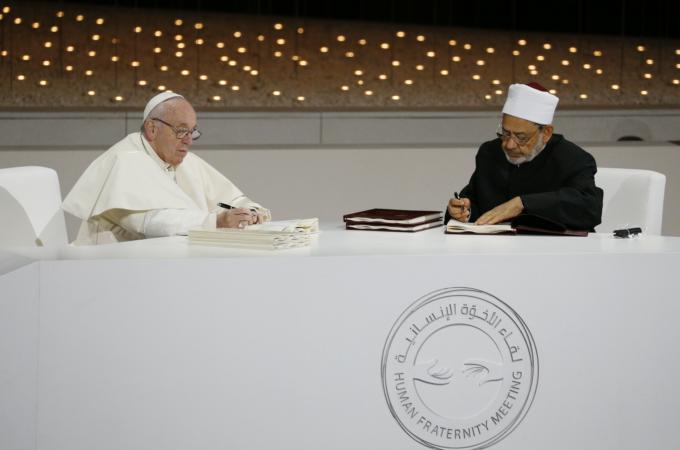One world religion?
Q. Recently, Pope Francis signed a document with Muslim leaders about there being one world religion. How can that be? Some of my non-Catholic friends are accusing the pope of being out of line. What really happened? (Batesville, Arkansas)
A. I have read the document to which you refer and nowhere can I find a call for "one world religion." Instead, it is a plea for peace and nonviolence, a call to Catholics, Muslims and all believers "to unite and work together" in order to serve "as a guide for future generations to advance a culture of mutual respect in the awareness of the great divine grace that makes all human beings brothers and sisters."
The joint declaration, titled "A Document on Human Fraternity for World Peace and Living Together," was signed by Pope Francis and Sheikh Ahmad el-Tayeb, a grand imam of Sunni Muslims, during a visit by the pope to the United Arab Emirates in early February 2019.
It calls on world leaders "to work strenuously to spread the culture of tolerance and of living together in peace; to intervene at the earliest opportunity to stop the shedding of innocent blood and bring an end to wars, conflicts, environmental decay and the moral and cultural decline that the world is presently experiencing."
The declaration condemns "all those practices that are a threat to life such as genocide, acts of terrorism, forced displacement, human trafficking, abortion and euthanasia." It notes "that among the most important causes of the crises of the modern world are a desensitized human conscience, a distancing from religious values and a prevailing individualism accompanied by materialistic philosophies."
Far from urging, as your question says, "one world religion," the document states instead that "the pluralism and the diversity of religions, color, sex, race and language are willed by God in his wisdom" -- an observation that has been taken by some Catholic commentators simply to mean that the variety of religions comes under the permissive will of God and indicates the natural desire of humans to know God.
Q. My mother was very religious and she always told us that during Lent, whatever you gave up -- ice cream, candy, etc. -- you could have on Sundays. Is that true? Do Sundays count as part of Lent? (Green Bay, Wisconsin)
A. I'll answer your second question first, because that's the easier one: "Do Sundays count as part of Lent?" The clear answer is "Yes." In the liturgical books of the Church, the season of Lent begins on Ash Wednesday and ends just before the Mass of the Lord's Supper on the evening of Holy Thursday. In the Roman Missal, for example, March 10 this year (2019) was designated as the "First Sunday of Lent."
Now, for the more complicated part: If you're fasting on candy for Lent, may you eat it on Sundays? The answer is: It's your own call. Each of us is required in a general way to do penance, but the particular manner is a personal choice. There's no law involved or question of sinfulness -- you're just doing something nice for God, in return for the sacrifice Jesus made for us.
Now it's true that the church has always viewed Sunday as a day of celebration in remembrance of the Resurrection, a kind of "little Easter," and has never required fasting on Sundays -- so I suppose there's some warrant, when you've adopted a Lenten penance, for "taking Sundays off."
But I think it's probably better to continue the practice throughout the whole Lenten season, Sundays included; if I gave up candy for Lent but ate it on each of the six Sundays, that doesn't seem like much of a sacrifice. (Which reminds me that a couple of years ago at a school Mass on Ash Wednesday, I asked the kids what they were giving up for Lent. One little boy raised his hand and said: "Hitting my sister." I hope that he didn't take Sundays off!)
- Father Kenneth Doyle is a columnist for Catholic News Service



















